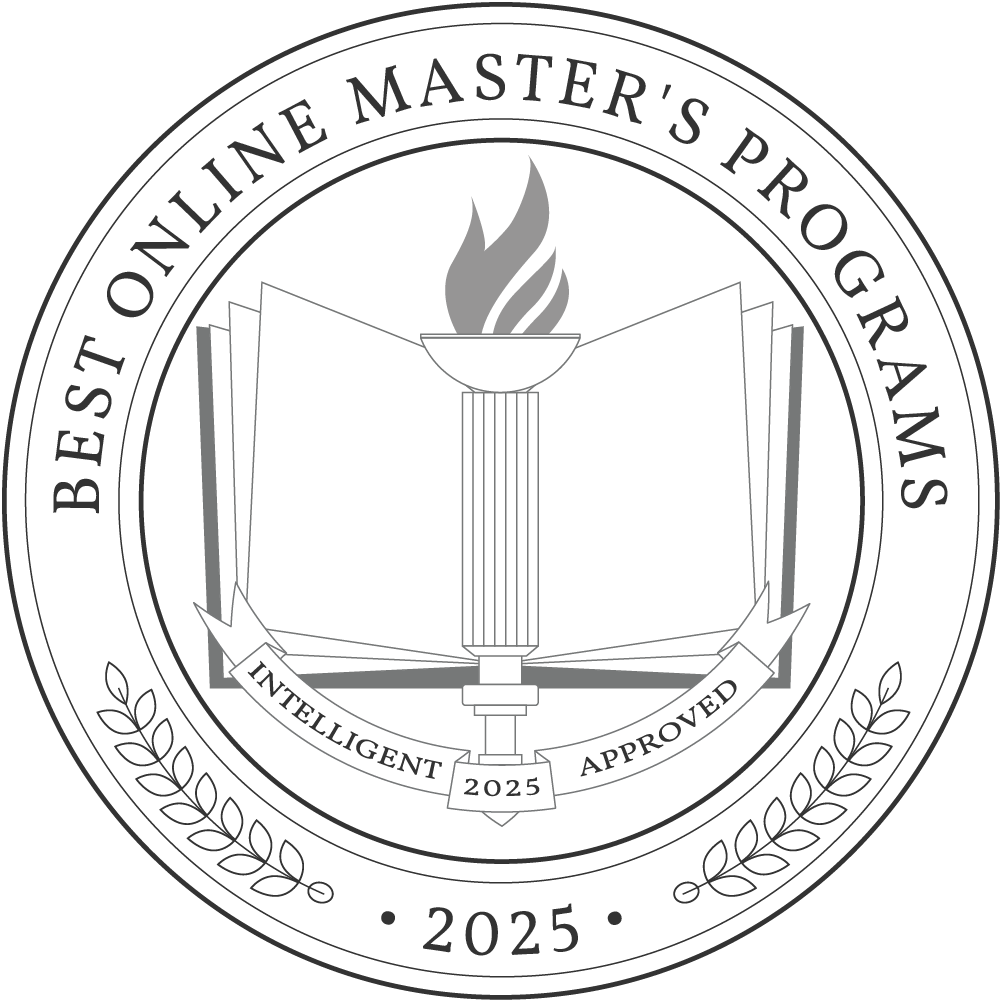Selecting an online master’s degree program is a personal decision that depends on many factors. To help you find the one that’s best for you, we reviewed hundreds of online master’s degree programs for high-quality programs that fit a variety of needs. Our team spent more than 40 hours reviewing and comparing program data, including cost, graduation and retention rates, curriculum, and reputable rankings to create our list of the top online master’s degree programs.
We also interviewed College Admissions and Education Advisor Blanca Villagomez, a Program Counselor and Coordinator for UC-Irvine with more than 10 years of experience working with diverse and underrepresented student populations. Villagomez covers what students need to know when considering an online master’s degree, offers tips for selecting the right online master’s program, and answers frequently asked questions.
Why Trust Us
The Intelligent.com Higher Education Team is dedicated to providing students with independent, equitable school and program rankings and well-researched resources. Our expert-driven articles cover topics related to online colleges and programs, paying for school, and career outlooks. We use data from the U.S. Department of Education’s College Scorecard, the National Center for Education Statistics, and other reputable educational and professional organizations. Our academic advisory team reviews content and verifies accuracy throughout the year for the most current information. Partnerships do not influence rankings or editorial decisions.
- Analyzed over 2,000 national, accredited, and nonprofit colleges and universities
- 800+ rankings pages are reviewed and updated yearly
- Content is informed by reputable sources, surveys, and interviews with academic advisors and other experts
- Over 100 data points are reviewed for accuracy and quality throughout the year, including sources
How we rank schools
Our list features the best online Master’s degree programs at top colleges nationwide. Each school featured is a nonprofit, accredited institution — either public or private — with a high standard of academic quality for post-secondary institutions.
We evaluated each school’s program on tuition costs, admission, retention and graduation rates, faculty, reputation, and the student resources provided for online students. We collected data from trusted sources like the National Center for Education Statistics, individual school and program websites, school admissions counselors, and other data sources. Then, we calculated the Intelligent Score on a scale of 0 to 100 based on the following criterion:
Academic Quality:
- Admission rate versus enrollment rate
- Retention rate of students who return after year one
- Accreditation status (regional and programmatic)
- Nonprofit status, both private and public institutions
Graduation Rate
- Overall graduation rate
- Total number of currently enrolled students, including diversity metrics
- Student-to-faculty ratio
Cost and ROI
- In-state and out-of-state per-credit tuition rates and fees
- Required credits to graduate
- Earning potential after graduation
- Availability of federal student loans, scholarships, and other financial aid options
Student Resources
- Available student services for online-only and hybrid programs
- On-campus amenities like tutoring centers and the number of libraries
Read more about our ranking methodology.
Best 50 Online Master’s Degree Programs
FiltersInstitution Type
Status
- Intelligent Score
- Alphabetically By University Name
- Acceptance Rate
- Enrollment
- In-state Graduate Tuition
- Out-of-state Graduate Tuition
- In-state Undergraduate Tuition
- Out-of-state Undergraduate Tuition

New York University
Intelligent Score: 99.69In-state: $52,204
Out-of-state: $52,204
In-state: $34,704
Out-of-state: $34,704
SAT: 1370-1540
ACT: 31-34
$2,185
Online
Middle States Commission on Higher Education
30-36

University of Florida
Intelligent Score: 99.14In-state: $4,477
Out-of-state: $25,694
In-state: $10,770
Out-of-state: $10,770
SAT: 1290-1460
ACT: 29-33
Resident: $448
Non-Resident: $1,139
Online
Southern Association of Colleges and Schools Commission on Colleges
30-36

Arizona State University
Intelligent Score: 98.1In-state: $10,710
Out-of-state: $28,800
In-state: $11,720
Out-of-state: $11,720
SAT: 1100-1320
ACT: 21-28
$543 - $1,343
Online
Higher Learning Commission
30-45

University of North Carolina at Chapel Hill
Intelligent Score: 97.84In-state: $7,019
Out-of-state: $34,198
In-state: $10,552
Out-of-state: $10,552
SAT: 1280-1490
ACT: 28-33
Resident: $598 - $2,814
Non-Resident: $1,634 - $3,824
Online
Southern Association of Colleges and Schools Commission on Colleges
30-48

University of Michigan
Intelligent Score: 97.09In-state: $16,520
Out-of-state: $53,669
In-state: $24,344
Out-of-state: $24,344
SAT: 1340-1520
ACT: 31-34
Resident: $1,560 - $1,915
Non-Resident: $1,624 - $3,330
Online
Higher Learning Commission
30-57

Johns Hopkins University
Intelligent Score: 96.91In-state: $54,160
Out-of-state: $54,160
In-state: $57,010
Out-of-state: $57,010
SAT: 1470-1560
ACT: 34-36
$1,666 - $1,800
Online
Middle States Commission on Higher Education
30-36

Georgia Tech
Intelligent Score: 96.6In-state: $28,106
Out-of-state: $49,218
In-state: $27,898
Out-of-state: $27,898
SAT: 1370-1530
ACT: 31-35
In-State: $686 - $1,261
Out-of-State: $1,400 - $1,939
Online, On-Campus
Southern Association of Colleges and Schools Commission on Colleges
30

Duke The Graduate School
Intelligent Score: 96.03In-state: $55,880
Out-of-state: $55,880
In-state: $57,900
Out-of-state: $57,900
SAT: 1470-1570
ACT: 34-35
$3,780
Online, On-Campus
Southern Association of Colleges and Schools Commission on Colleges
30

University of Southern California
Intelligent Score: 95.29In-state: $59,260
Out-of-state: $59,260
In-state: $47,880
Out-of-state: $47,880
SAT: 1340-1530
ACT: 30-34
$1,995
Online
WASC Senior College and University Commission
30-36

The University of Texas at Austin
Intelligent Score: 94.18In-state: $11,448
Out-of-state: $40,032
In-state: $12,028
Out-of-state: $12,028
SAT: 1210-1470
ACT: 26-33
Resident: $1,177 - $1,469
Non-Resident: $1,822 - $2,082
Online, On-Campus
Southern Association of Colleges and Schools Commission on Colleges
30

Sam Houston State University
Intelligent Score: 93.91In-state: $5,856
Out-of-state: $15,672
In-state: $5,765
Out-of-state: $5,765
SAT: 970-1120
ACT: 18-23
Resident: $741
Non-Resident: $1,151
Online
Southern Association of Colleges and Schools Commission on Colleges
30-36

Boston University
Intelligent Score: 93.5In-state: $56,854
Out-of-state: $56,854
In-state: $56,854
Out-of-state: $56,854
SAT: 1310-1500
ACT: 30-34
$955 - $997
Online
New England Commission of Higher Education
32-40

University of Missouri
Intelligent Score: 93.03In-state: $9,330
Out-of-state: $27,612
In-state: $9,478
Out-of-state: $9,478
SAT: 1110-1320
ACT: 23-29
$600 - $610
Online
Higher Learning Commission
30

Michigan State University
Intelligent Score: 92.27In-state: $15,555
Out-of-state: $40,384
In-state: $18,858
Out-of-state: $18,858
SAT: 1100-1300
ACT: 23-29
$817 - $995
Online, On-Campus
Higher Learning Commission
30-57

University of Arizona
Intelligent Score: 92.14In-state: $10,990
Out-of-state: $33,273
In-state: $11,938
Out-of-state: $11,938
SAT: 1090-1350
ACT: 21-29
$650 - $,1332
Online
WASC Senior College and University Commission
30

CSU Global
Intelligent Score: 89.75In-state: $9,426
Out-of-state: $28,147
In-state: $10,520
Out-of-state: $10,520
SAT: 1070-1280
ACT: 23-29
$675
Online
Higher Learning Commission
36

UMass Amherst
Intelligent Score: 89.4In-state: $15,791
Out-of-state: $35,779
In-state: $14,014
Out-of-state: $14,014
SAT: 1200-1390
ACT: 27-32
In-State: $663
Out-of-State: $1,526
Online, On-Campus
New England Commission of Higher Education
30

Syracuse University
Intelligent Score: 88.81In-state: $53,432
Out-of-state: $53,432
In-state: $40,392
Out-of-state: $40,392
SAT: N/A
ACT: N/A
$1,945
Online
Middle States Commission on Higher Education
30-54
What You Should Know About Online Master’s Degree Programs
If this is your first experience with earning a degree online, there are a few things to know about how online degree programs function and how to ensure you’re choosing a high-quality online master’s program.
Program delivery formats
Often students assume that if a program’s advertised as “online,” it means all classes and requirements can be completed remotely. In many cases, that’s true, but there are exceptions. For some online graduate programs, the online component applies only to classes, with requirements like clinical rotations or internships that students must attend in-person at a specific location. Other online graduate programs are delivered in hybrid, blended, or low-residency formats, which combine online and in-person learning. Before starting your search, consider which type of delivery format best suits your lifestyle, so you can focus on finding the right online master’s program for your particular needs.
Class schedules
There are two types of class schedules for online learning. Synchronous classes meet virtually at designated days and times. These online education classes tend to feature more interaction between faculty and students and hands-on learning. However, students must be available at specific, predetermined times in order to participate.
Asynchronous classes have no set meeting times. Students can access lessons and assignments 24/7, and complete them according to their own availability. Lessons are provided in the form of pre-recorded lectures, videos, reading assignments, and discussion forums. This is the most flexible type of online program, but the lack of consistent meetings means students need to be comfortable learning autonomously.
Pacing
Students in online learning programs have the option of choosing to enroll on a full-time or part-time basis. Each school sets its own policies, but typically graduate students are considered full-time if they take a minimum of nine credits per term. Specifics vary by program and institution, but typically online master’s programs can be completed in 2-3 years of full-time study or 3-5 years of part-time study.
Because of the flexibility and convenience of online learning, many programs offer accelerated degrees, in which students complete coursework in a compressed time frame, such as one year or 18 months. These programs mean less time in school, but they require a bigger commitment while enrolled because they’re condensing the same amount of material into a shorter time frame.
Accreditation
There are two types of institutions that offer online degrees — brick-and-mortar institutions with an online learning component, like the University of Houston and Florida State University, and schools that exist entirely online, like Western Governors University. Quality online master’s programs are available at both types of institutions. One way to ensure you’re enrolling in a worthwhile program is to confirm the school’s accreditation status. This means the institution meets standards for educational quality set by the U.S. Department of Education and the accrediting bodies it oversees. Accreditation not only affects the quality of the education you receive, but it can impact your financial aid eligibility, employment opportunities, and future enrollment in other postsecondary programs.
Non-profit and for-profit status
Students should also be aware of the school’s status as a non-profit or for-profit institution, as both operate in the world of online degrees. As the name implies, for-profit colleges are designed to make money, which may be reinvested in the school — or may go into the pockets of the school’s executives and investors. At a non-profit college, any revenue must be reinvested in the institution, in the form of faculty and staff salaries, infrastructure, student services, and more. While there are reputable for-profit schools, students should be aware that their for-profit status may impact cost, financial aid availability, accreditation eligibility, and business practices. Our list focuses on non-profit institutions, including both public and private schools.
Eligibility and restrictions
While online degree programs greatly increase education accessibility for students, there are some restrictions in the U.S. that may prevent students from attending a specific school. Institutions must be authorized by individual states to grant degrees to students living in those states. Without this authorization, students aren’t eligible for enrollment. Over 2,300 institutions throughout 49 states, Washington D.C., Puerto Rico, and the U.S. Virgin Islands participate in the National Council for State Authorization Reciprocity Agreements (NC-SARA), ensuring their distance education programs are authorized to operate and grant degrees in multiple states.
Students who are considering online master’s degrees in fields that require licensure should also review their state’s licensure requirements. In some cases, students are required to obtain their degree in the state in which they plan to get licensed.
Our Research
This list features some of the best online master’s programs at top colleges across the country. Each school featured is a nonprofit, accredited institution — either public or private — with a high standard of academic quality for post-secondary institutions.
We evaluated each school on tuition costs, student services, faculty, reputation, and admission, retention, and graduation rates. Then, we calculated the Intelligent Score on a scale of 0 to 100. Read more about our ranking methodology.
Next, we compared this comprehensive list of online master’s programs to a list of aggregated college rankings from reputable publications like U.S. News & World Report, among others, to simplify a student’s college search. We pored through these rankings so students don’t have to.
Online Master’s Degree Programs That Might Interest You
Learn about start dates, transferring credits, availability of financial aid, and more by contacting the universities below.
How to Choose the Right Online Master’s Degree Program
When it comes to choosing the ‘right’ online master’s degree, Villagomez says, “It’s about finding one that aligns with your current priorities, motivations, skillset, and career aspirations.” That means taking time to gain clarity on what those priorities and aspirations are and conducting thorough research on the pros and cons of individual master’s programs before deciding.
“Getting in the right mindset and staying organized are key for the master’s degree search process,” says Villagomez. “Select your preferred method of keeping notes, whether it’s a notebook or an online spreadsheet. Make sure the information is centralized in one location since you’ll reference it continuously.”
Once you have an organization system in place, Villagomez recommends the following steps for choosing an online master’s degree program:
Step 1: Choose your area of study
The first step in your online master’s degree journey is deciding what you want to study.
There are hundreds of options for graduate majors. Many are similar but have subtle differences. For example, students interested in an MBA can choose between a general MBA or one specializing in areas like healthcare management, IT, or human resources.
There are also various types of online master’s degrees, including Master of Arts, Master of Science, Master of Fine Arts, Master of Business Administration, and more. Different types of degrees have different credit and curriculum requirements, which can influence the length and delivery of the program.
To decide which area of study and type of degree is right for you, consider why you want a master’s degree. Are you seeking advancement in your current field? Pivoting to a new career? Do you want to acquire specific professional credentials, increase your earning potential, or continue into further post-secondary study? What specific skills and knowledge do you want to gain from this educational experience?
“Gaining clarity on your interests can help you find the program curriculum that is best aligned with them,” says Villagomez.
There are many ways for online students to get this clarity. Here are some Villagomez recommends:
- Create a list of interests and aspects of current or former jobs that bring you the most satisfaction.
- Identify the skills and expertise you already have and consider what types of online master’s programs you’re qualified for based on your qualifications. You can also use a free or low-cost online skills assessment like the Clifton Strengths evaluation, High 5 Test, or Career Explorer to help identify strengths and areas of improvement.
- Use online resources like Indeed’s Career Guide, the Myers-Briggs career test, or TeamBuilding.com’s career tests to help you align your interests with potential career paths.
- If you’re still enrolled in an undergraduate program, use your school’s career services center for resources and guidance.
- If you’ve already graduated, contact your alma mater to see if they offer any career advising services for alumni.
Step 2: Research schools and programs
Once you know what you want to study, the next step is deciding where you want to study.
Students often start by looking at schools that offer the specific program of study they want, but there are many other factors that need to be taken into consideration when choosing an online master’s degree program.
“Some key factors that students should also consider are flexibility and accessibility, cost of attendance, financial aid availability, program duration, curriculum design, faculty, networking opportunities, and more,” says Villagomez.
The good news is, online research makes it easy to find for schools and programs that meet your parameters.
“Just like you research the best restaurants using Yelp filters, you can do the same to narrow your search options for master’s programs,” Villagomez says. The more specific you are about what you want from an online master’s degree, the easier it will be to find one that suits your needs.
Villagomez also reminds students to confirm that the institution and, when applicable, the program are accredited to ensure the quality of the program and that financial aid and post-graduation employment opportunities won’t be adversely affected.
In addition to researching online master’s programs via their websites, prospective students can also contact school admissions counselors or program representatives, attend virtual open houses, follow schools and programs on social media, and request print admissions materials.
Current and former colleagues, supervisors, instructors, and classmates can also be excellent sources of support and information regarding careers and online master’s programs. Says Villagomez, “Reconnect with previous professors you enjoyed, current and former supervisors, and community organizations to gain insight and recommendations on choosing the program that’s the right fit.”
Step 3: Select the school(s) to which you’ll apply
After completing your research, narrow your options down to the list of master’s degree programs to which you’ll apply. The number of schools graduate students apply to varies. If you’re looking at competitive programs, you may want to apply to a few schools to keep your options open. However, it’s not uncommon for master’s-level students to focus on one specific graduate school based on their interests, a program’s faculty or research, or logistical considerations.
Once you have your list of potential online master’s programs, find out what their specific application requirements are, including deadlines. Many online master’s programs offer rolling admissions and multiple start dates. However, depending on the process, it can take a few weeks to a few months before an application is complete. Give yourself enough time to submit all pieces of your application so you can be considered for your desired start term.
Step 4: Prepare and submit your application
Selecting the programs to which you’re applying will guide the steps you need to take to submit your application.
Depending on the requirements of the graduate school, these steps may include the following:
- Preparing for and taking standardized tests like the GRE or GMAT
- Requesting letters of recommendation from current or former instructors, managers, or colleagues
- Completing prerequisite coursework required for admission
- Ordering official transcripts from higher education institutions you attended
Confirm with the online master’s programs you’re applying to if application materials can be submitted individually or if they should be sent together.
You can also prepare for additional admissions steps, such as interviews or portfolio reviews.
Step 5: Determine how you’ll pay for your degree
As you prepare and submit your application, you should also consider how you’ll pay for your online master’s degree if you’re admitted.
During your research process, be sure to learn about the costs of attending an online master’s program and what types of financial aid and scholarships are available. This information may be available on the school’s website, or you can contact their financial aid office.
Graduate students can apply for federal student loans through the Free Application for Federal Student Aid (FAFSA). The application process for school-specific aid and scholarships will vary by institution.
Employed students should also check with their employers regarding possible tuition assistance or reimbursement plans.
Discover Specific Online Master’s Degrees
Art & Design
Business & Management
- Accounting
- Business Analytics
- Business Law
- Certificate in Finance
- Certificate in Human Resources
- Construction Management
- Digital Marketing
- Economics
- Emergency Management
- Entertainment Management
- Entrepreneurship
- Finance
- Forensic Accounting
- Hospitality Management
- Human Resources
- Management
- MBA in Business Administration (No GMAT)
- MBA in Business Administration
- MBA in Entrepreneurship
- MBA in Finance
- MBA in Healthcare Management
- MBA in Human Resources
- MBA in Information Systems Management
- MBA in Information Technology
- MBA in International Business
- MBA in Marketing
- MBA in Nonprofit Management
- MBA in Project Management
- MBA in Supply Chain Management
- MBA in Sustainability
- Negotiation And Conflict Management
- Organizational Leadership
- Organizational Management
- Project Management
- Public Administration
- Public Policy
- Public Relations
- Real Estate
- Sports Management
- Supply Chain Management
- Taxation
- Training And Development
Computer & Technology
Criminal Justice & Legal Studies
Education & Teaching
- Adult Education
- Assessment And Measurement
- Certificate in Elementary Education
- Child Development
- Coaching
- Curriculum and Instruction
- Early Childhood Education
- Education
- Educational Administration
- Educational Leadership
- Elementary Education
- Gifted And Talented Education
- Health Education
- Higher Education
- K-12 Education
- Math Education
- Online Teaching
- Reading And Literacy
- Science Education
- Secondary Education
- Special Education
Liberal Arts & Humanities
Nursing & Healthcare
Psychology & Counseling
Find The Best Online Degree Program For You
Advice from an Expert

Blanca Villagomez
College Admissions and Education Advisor
Blanca Villagomez is a seasoned professional with over ten years of experience developing programs, curriculums, and initiatives supporting diverse and underrepresented student populations. She completed her master’s in Counseling at CSU Long Beach (CSULB). Her experiences navigating college as a first-generation, low-income student equipped her with a deep understanding of the educational inequities that impact student sense of belonging. Her formal training in educational counseling has equipped her with a skill set in fostering meaningful relationships with students that prepare them to graduate successfully. She currently serves as a Program Counselor and Coordinator for the University of California, Irvine (UCI). As a lifelong learner, Blanca strives to create growth experiences that help students thrive in college and beyond.
What questions should students ask when considering an online master's degree?
- What are your motivations for earning a master’s degree? Often, there is external pressure to pursue a graduate degree from social comparison, familial expectations, or cultural norms. Pursuing a master’s degree needs to be a personal choice since you’ll be investing your time, energy, and money into the process. A master’s degree isn’t required to advance in all careers, so conducting extensive research and multiple informational interviews with current graduate students, alums, and professionals in your desired career is important.
- What topics are most interesting to me that I want to become an expert in? Consider who you want to work with in your day-to-day life, which type of individuals you want to help, and what issues, problems, or topics are most interesting to you that you would like to become an expert in.
When is the best time for a student to attend graduate school?
The decision to pursue a graduate degree ultimately depends on your current priorities, life circumstances, and career goals. Consider how pursuing a master’s degree will impact your finances, personal relationships, and life plans. Assess the costs and benefits. Additionally, ask yourself if you’re currently competitively eligible for graduate programs. If you don’t feel as qualified or competitive yet, think about how you can start developing the necessary skills or strengthen your application.
Are there networking opportunities for students in online master's programs?
While traditional in-person programs offer easier access to connect with peers and faculty, online programs still provide many opportunities to foster meaningful connections. You can prioritize your networking efforts by understanding what kind of people you want to meet. You might find a more diverse student body in online programs due to the increased accessibility that allows anyone to take classes remotely.
Should I choose a regular or accelerated online master's program?
If time is of the essence to you, some accelerated online programs can help you complete your degree quicker. However, due to the fast pace, I usually recommend these programs only to those with strong time management and stress management skills.
What additional advice would you give students interested in earning a master's degree?
My greatest advice is to develop a healthy and positive mindset by accepting that this investment comes with temporary sacrifices but long-term gains. Earning a master’s degree is a marathon, not a sprint so start developing a mindset to focus one day at a time.
I also recommend learning to set boundaries to help you manage your time and stress effectively. Along with that, learn how to ask for help and accept it when needed.
Create your own sense of community within the master’s program and maintain meaningful connections with your peers and faculty. Knowing that you have a strong network of individuals that want to see you succeed can be a great source of motivation.
Finally, pursuing a master’s degree is a unique personal experience, so focus on paving your own career path to reduce the social comparison that can surround you.
Online Master’s Degree Frequently Asked Questions
How much does an online master’s degree cost?
Many students assume an online master’s degree will be less expensive than an in-person degree, but that’s not necessarily true. Several factors influence the overall cost of an online program. When determining how much their master’s degree will cost, we recommend students consider the following factors:
Tuition is the main cost associated with an online degree.
Most online graduate programs charge tuition on a per-credit basis, but the specific amount varies based on multiple factors:
- Institution status — Tuition costs at public universities are typically lower than at private institutions. According to the National Center for Education Statistics, in the 2020-21 academic year, the average annual tuition for graduate programs was $12,394 at public universities and $26,621 at private universities.
- Student residency status — Public institutions may charge students a higher tuition rate if they live out of state versus in-state. Private institutions charge the same tuition regardless of residency.
- Enrollment status — An online degree program may charge students different tuition rates based on the number of credits they’re taking, with students enrolled in more classes getting a lower per-credit rate.
- Student military status — Many schools offer discounted tuition for students who are active-duty military, veterans, or married to service members.
- Degree program — Per-credit tuition rates for graduate programs often vary by the specific area of study based on projected ROI, program reputation and popularity, resources needed to run the program, and more. For example, the Education Data Initiative reports that the average cost of an MBA is $61,800, compared to $52,000 for a Master’s in Education and $59,720 for a Master’s in Science.
But the cost of an online master’s degree includes more than just tuition.
Here are additional costs that contribute to the price of your online master’s:
- Fees — Schools often charge additional fees for tech support, online student services, and more.
- Technology — Online students need good-quality tech, including computers, webcams, microphones, and reliable high-speed internet. Depending on your program of study, you may also need specific software or hardware.
- Books and materials — Even if a class is delivered online, it may still use textbooks and other hard-copy materials you’ll have to purchase on your own.
- Travel costs — Some online master’s programs require attendance at in-person events, such as internships, orientations, residencies, or other experiential learning opportunities, which may have related costs for transportation, hotels, etc.
Some factors can make an online program more affordable.
- Room and board — Rather than pay for on-campus housing and meals at a fixed price, online students have more flexibility with where they live and how to budget for living expenses.
- Location — Online students can live in a more affordable area even if they’re attending a school located somewhere with a higher cost of living. There are also many public universities that offer out-of-state students the same tuition rate as those who live in-state.
- Commuting — Students completing their degrees at home spend less money on transportation, like gas and car maintenance or public transit.
- Flexibility — Many students choose online programs to work full- or part-time and maintain a steady income while completing their degree.
Ultimately, the only way to know the actual cost of an online master’s program is to research specific programs and compare their tuition and fees. This information is typically available on a program’s website, or you can learn more by contacting the school’s financial aid office.
How long does it take to earn an online master’s degree?
The specific length of time it takes to earn an online master’s degree varies by program. Generally, it takes anywhere from 18 months to 3 years to earn an online master’s degree. There are also some options, such as accelerated master’s in psychology programs, that allow you to achieve this level of education in just one year.
Several factors influence how long it’ll take for you to earn your online degree. These include the total number of credits in the program (master’s degrees typically require 30-48 credits), your enrollment status (full-time versus part-time), the pace of study (self-paced versus structured), and the course delivery format (synchronous versus asynchronous). Transferring previously earned credits from another online degree program can shorten completion time.
Earning a master’s degree may take less time online than in-person, as asynchronous classes allow students the flexibility to complete more courses per term. Before enrolling in an online master’s program, confirm the expected length of the program with a program representative. It is also important to verify if there is a maximum period of time in which a student must complete the online master’s program.
How do I apply to an online master’s degree program?
To apply for an online master’s degree program, you should first review the admissions requirements of the program(s) you are interested in. Each school and program have its own specific admissions process and deadlines. You can find this information on the school’s website or by contacting their admissions office.
After that, you’ll complete an application and submit the required supplemental application materials. These can include official transcripts from all colleges attended, letters of recommendation, personal statements, and resumes.
Some online master’s programs may also require standardized test scores, such as the GRE or GMAT. You can have your scores sent directly from the testing agency to the school(s) you’re applying to if you take one or more of these tests.
It’s important to be mindful of deadlines to ensure that all application materials are submitted on time. We also recommend confirming a program’s admission requirements, such as minimum undergraduate GPA, prerequisite courses, or a minimum level of work experience.
Is earning an online master’s degree worth it?
“As the landscape of higher education is evolving, online master’s programs can be a strategic investment of your time, money, and energy resources to advance your career,” Villagomez says. Among the numerous documented benefits of earning a master’s degree, there’s the increased earning potential. Individuals with master’s degrees earn a median weekly salary of $1,737, compared to $1,170 per week for all employees in the U.S.
Having a master’s degree can also lower your unemployment risk. According to the U.S. Bureau of Labor Statistics, the unemployment rate for those with master’s degrees is 2.0%, compared to 2.2% for those with bachelor’s degrees and 2.7% for those with an associate degree.
More career options are also available to individuals with a master’s degree. This can include in-demand jobs like computer and information research scientists, social workers, nurse practitioners, statisticians, epidemiologists, and more.
Other benefits of earning an online master’s degree include the following:
- Expanding your knowledge base and skill set.
- Making professional connections that can lead to jobs and other opportunities.
- Exploring new career paths.
However, as Villagomez says, “Your return on investment ultimately depends on your personal needs, educational goals, and potential career outcomes.” If you’re ready to commit the time and energy to earning an online master’s degree, the experience can be well worth it.
Online Master’s Degree Scholarship Database
Intelligent Scholarship Finder Tool
"A Helping Hand" Scholarship
Award Amount: $500
Due Date: January 31, 2025
"Follow Your Own Path" Essay Scholarship
Award Amount: $500
Due Date: January 31, 2025
"Tuition Solution" Scholarship for STEM Students
Award Amount: $500
Due Date: January 31, 2025
$25k "Be Bold" No-Essay Scholarship
Award Amount: $25,000
Due Date: Closed for 2024
(ISC) Graduate Cybersecurity Scholarship
Award Amount: $5,000
Due Date: Closed for 2024
(ISC) Women in Information Security Scholarship
Award Amount: $5,000
Due Date: Closed for 2024
A.C. "Kate" & Leo Joseph Merlone St. Dominic Catholic Church of Saginaw Member Scholarship
Award Amount: Varies
Due Date: Closed for 2024
A.C. "Kate" & Leo Joseph Merlone Teaching Scholarship
Award Amount: Varies
Due Date: Closed for 2024
a/e ProNet David W. Lakamp Scholarship
Award Amount: $5,000
Due Date: Closed for 2024
AAAE Native American Scholarship
Award Amount: $1,500
Due Date: March 15, 2025
Learn More About Online Master’s Degrees
Have additional questions about earning an online master’s degree? Our research team and experts have provided answers to students’ frequently asked questions about online master’s degrees, including how much an online master’s degree costs and the availability and accessibility of these types of programs. You can find these resources below, along with additional information about financial aid, standardized test prep, applying to programs, and more.
- Best Accelerated Online Master’s Degree Programs
- Best Online Master’s Programs That Don’t Require the GRE
- Best One-Year Online Master’s Programs
- Can I Get A Master’s Degree Online?
- Easiest Masters Degree Programs Online
- How Much Does an Online Master’s Degree Cost?
- Is A Masters In Finance Worth It?
- Master’s Degree Program Guide
- What Can You Do With A Masters In Finance?
- Best Online Photography Degree Programs
- Most Affordable Online Master’s in Accounting Programs



